|
|
|
Sort Order |
|
|
|
Items / Page
|
|
|
|
|
|
|
| Srl | Item |
| 1 |
ID:
135214
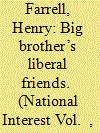

|
|
|
|
|
| Summary/Abstract |
Sean Wilentz, George Packer and Michael Kinsley are a dismal advertisement for the current state of mainstream liberal thought in America. They have systematically misrepresented and misunderstood Edward Snowden and the NSA.
|
|
|
|
|
|
|
|
|
|
|
|
|
|
|
|
| 2 |
ID:
155488
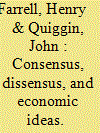

|
|
|
|
|
| Summary/Abstract |
During the recent economic crisis, Keynesian ideas about fiscal stimulus briefly seemed to form the basis of a new expert consensus about how to deal with demand shocks. However, this apparent consensus soon collapsed into a continuing dissensus, with important consequences for policy. Neither conventional bargaining accounts nor existing theories of the role of ideas in policy outcomes easily explain the arc of international responses to the Great Recession. In this article, we propose that sociological arguments about professions, in conjunction with those about spaces of political contention as ecologies, provide a better understanding of the puzzle of Keynesianism’s rise and decline. The internal dynamics of prestige and status within the profession of economics intersected with policy arguments between states so as to make macroeconomic policy a “hinge” issue, over which coalitions in both ecologies contended. This explains how Keynesian economists and political actors worked together in the first phase of the crisis to advocate for and implement fiscal stimulus. It also explains why aggrieved policy actors, who did not favor stimulus, could help disrupt the apparent consensus in the second phase of the crisis by promoting the views of dissident economists.
|
|
|
|
|
|
|
|
|
|
|
|
|
|
|
|
| 3 |
ID:
055921
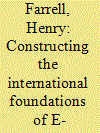

|
|
|
| 4 |
ID:
129992
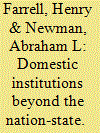

|
|
|
|
|
| Publication |
2014.
|
| Summary/Abstract |
What is the relationship between domestic and international politics in a world of economic interdependence? This article discusses and organizes an emerging body of scholarship, which the authors label the new interdependence approach, addressing how transnational interactions shape domestic institutions and global politics in a world of economic interdependence. This literature makes three important contributions. First, it examines how domestic institutions affect the ability of political actors to construct the rules and norms governing interdependent relations and thus present a source of asymmetric power. Second, it explores how interdependence alters domestic political institutions through processes of diffusion, transgovernmental coordination, and extraterritorial application and in turn how it changes the national institutions mediating internal debates on globalization. Third, it studies the shifting boundaries of political contestation through which substate actors affect decision making in foreign jurisdictions. Given the importance of institutional change to the new interdependence agenda, the authors suggest several instances where historical institutionalist tools might be exploited to address these transnational dynamics, in particular, mechanisms of cross-national sequencing and change strategies of substate actors. As globalization continues, it will be ever more difficult to examine national trajectories of institutional change in isolation from each other. Equally, it will be difficult to understand international institutions without paying attention to the ways in which they both transform and are transformed by domestic institutional politics. While the new interdependence approach does not yet cohere as a single voice, the authors believe that it offers an innovative agenda that holds tremendous promise for both comparative and international relations research as it calls on scholars to reconsider the dynamic nature of globalization for global politics.
|
|
|
|
|
|
|
|
|
|
|
|
|
|
|
|
| 5 |
ID:
124635
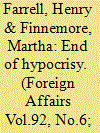

|
|
|
|
|
| Publication |
2013.
|
| Summary/Abstract |
The U.S. government seems outraged that people are leaking classified materials about its less attractive behavior. It certainly acts that way: three years ago, after Chelsea Manning, an army private then known as Bradley Manning, turned over hundreds of thousands of classified cables to the anti-secrecy group WikiLeaks, U.S. authorities imprisoned the soldier under conditions that the UN special rapporteur on torture deemed cruel and inhumane. The Senate's top Republican, Mitch McConnell, appearing on Meet the Press shortly thereafter, called WikiLeaks' founder, Julian Assange, "a high-tech terrorist."
|
|
|
|
|
|
|
|
|
|
|
|
|
|
|
|
| 6 |
ID:
173055
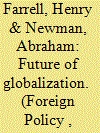

|
|
|
| 7 |
ID:
103412
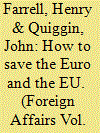

|
|
|
| 8 |
ID:
178560
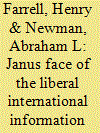

|
|
|
|
|
| Summary/Abstract |
Scholars and policymakers long believed that norms of global information openness and private-sector governance helped to sustain and promote liberalism. These norms are being increasingly contested within liberal democracies. In this article, we argue that a key source of debate over the Liberal International Information Order (LIIO), a sub-order of the Liberal International Order (LIO), is generated internally by “self-undermining feedback effects,” that is, mechanisms through which institutional arrangements undermine their own political conditions of survival over time. Empirically, we demonstrate how global governance of the Internet, transnational disinformation campaigns, and domestic information governance interact to sow the seeds of this contention. In particular, illiberal states converted norms of openness into a vector of attack, unsettling political bargains in liberal states concerning the LIIO. More generally, we set out a broader research agenda to show how the international relations discipline might better understand institutional change as well as the informational aspects of the current crisis in the LIO.
|
|
|
|
|
|
|
|
|
|
|
|
|
|
|
|
| 9 |
ID:
161966
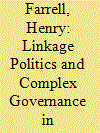

|
|
|
|
|
| Summary/Abstract |
Globalization blurs the traditional distinction between high and low politics, creating connections between previously discrete issue areas. An important existing literature focuses on how states may intentionally tie policy areas together to enhance cooperation. Building on recent scholarship in historical institutionalism, the authors emphasize how the extent of political discretion enjoyed by heads of state to negotiate and implement international agreements varies across issue areas. When policy domains are linked, so too are different domestic political configurations, each with its own opportunity structures or points of leverage. Opening up the possibility for such variation, the article demonstrates how actors other than states, such as nonstate and substate actors, use the heterogeneity of opportunity structures to influence negotiations and their institutional consequences. The authors examine the theory's purchase on international cooperation over intelligence, privacy, and data exchange in the transatlantic space in the wake of the terrorist attacks of September 11, 2001, and the revelations made public by Edward Snowden in 2013. The findings speak to critical international relations debates, including the role of nonstate actors in diplomacy, the interaction between domestic and international politics, and the consequences of globalization and digital technologies for the relationship between international political economy and security.
|
|
|
|
|
|
|
|
|
|
|
|
|
|
|
|
| 10 |
ID:
165841


|
|
|
|
|
| Summary/Abstract |
Delirium tilted over into imperial folly, as high officials began to think that they could use America’s economic power to re-order the world better to their liking.
|
|
|
|
|
|
|
|
|
|
|
|
|
|
|
|
| 11 |
ID:
173050
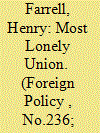

|
|
|
|
|
| Summary/Abstract |
The EU is a creature of multilateralism. Can it survive in a deglobalized world?
|
|
|
|
|
|
|
|
|
|
|
|
|
|
|
|
| 12 |
ID:
096287
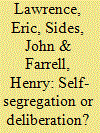

|
|
|
|
|
| Publication |
2010.
|
| Summary/Abstract |
Political scientists and political theorists debate the relationship between participation and deliberation among citizens with different political viewpoints. Blogs provide an important testing ground for their claims. We examine deliberation, polarization, and political participation among blog readers. We find that blog readers gravitate toward blogs that accord with their political beliefs. Few read blogs on both the left and right of the ideological spectrum. Furthermore, those who read left-wing blogs and those who read right-wing blogs are ideologically far apart. Blog readers are more polarized than either non-blog-readers or consumers of various television news programs, and roughly as polarized as US senators. Blog readers also participate more in politics than non-blog readers. Readers of blogs of different ideological dispositions do not participate less than those who read only blogs of one ideological disposition. Instead, readers of both left- and right-wing blogs and readers of exclusively leftwing blogs participate at similar levels, and both participate more than readers of exclusively right-wing blogs. This may reflect social movement-building efforts by left-wing bloggers.
|
|
|
|
|
|
|
|
|
|
|
|
|
|
|
|
| 13 |
ID:
142702
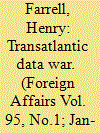

|
|
|
|
|
| Summary/Abstract |
Last October, the European Court of Justice struck down the Safe Harbor agreement , a 15-year-old transatlantic arrangement that permitted U.S. companies to transfer data, such as people’s Google-search histories, outside the EU. In invalidating the agreement, the ECJ found that the blurry relationship between private-sector data collection and national security in the United States violates the privacy rights of EU citizens whose data travel overseas. The decision leaves U.S. technology companies with extensive international operations on shaky legal ground.
|
|
|
|
|
|
|
|
|
|
|
|
|
|
|
|
| 14 |
ID:
167613
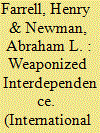

|
|
|
|
|
| Summary/Abstract |
Liberals claim that globalization has led to fragmentation and decentralized networks of power relations. This does not explain how states increasingly “weaponize interdependence” by leveraging global networks of informational and financial exchange for strategic advantage. The theoretical literature on network topography shows how standard models predict that many networks grow asymmetrically so that some nodes are far more connected than others. This model nicely describes several key global economic networks, centering on the United States and a few other states. Highly asymmetric networks allow states with (1) effective jurisdiction over the central economic nodes and (2) appropriate domestic institutions and norms to weaponize these structural advantages for coercive ends. In particular, two mechanisms can be identified. First, states can employ the “panopticon effect” to gather strategically valuable information. Second, they can employ the “chokepoint effect” to deny network access to adversaries. Tests of the plausibility of these arguments across two extended case studies that provide variation both in the extent of U.S. jurisdiction and in the presence of domestic institutions—the SWIFT financial messaging system and the internet—confirm the framework's expectations. A better understanding of the policy implications of the use and potential overuse of these tools, as well as the response strategies of targeted states, will recast scholarly debates on the relationship between economic globalization and state coercion.
|
|
|
|
|
|
|
|
|
|
|
|
|
|
|
|
| 15 |
ID:
057792
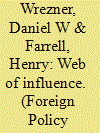

|
|
|
|
|
| Publication |
Nov-Dec 2004.
|
|
|
|
|
|
|
|
|
|
|
|
|
|
|
|
|
|
|
|
|